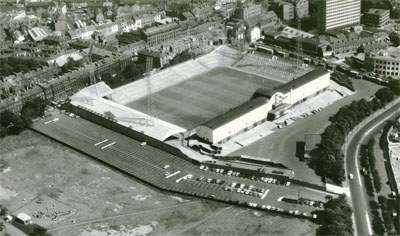Newcastle United FC

|
| St. James' Park in 1963. |
Newcastle United FC — History, Achievements & Evolution
Origins & Foundation (1892)
Newcastle United was founded in 1892 following the merger of two rival clubs, Newcastle East End and Newcastle West End. The union unified football in Tyneside and created a team capable of competing on the national stage. The newly formed club immediately settled at St James’ Park, a ground that would later grow into one of the most iconic stadiums in world football.
The Rise of a Giant (1900–1910)
The early 1900s marked Newcastle’s first golden era. Playing fast, elegant football, the Magpies quickly became known as one of the strongest teams in the country. The club won the First Division titles in 1905, 1907, and 1909, firmly establishing itself as a national powerhouse.
In 1910, Newcastle added the FA Cup to their trophy cabinet, solidifying their place among the elite. The squad’s dominance during this decade laid the foundation for a long-lasting football identity built on passion and competitiveness.
St James' Park — The Fortress
Few stadiums in world football possess the character and atmosphere of St James’ Park. Perched above the city, the stadium has hosted Newcastle matches since the club’s formation. Over time it has expanded dramatically, reflecting the growing ambition of the team and the unwavering loyalty of its supporters.
Post-war Success & FA Cup Glory
After World War II, Newcastle entered another successful period. The club won the FA Cup three times in five years: 1951, 1952, and 1955. This era remains one of the club’s proudest, with players like Jackie Milburn becoming Tyneside icons.
The Keegan Revolution — The Entertainers (1990s)
The 1990s brought a new identity under manager Kevin Keegan. Newcastle became famous worldwide as “The Entertainers”— a fearless attacking side that played high-speed, exhilarating football.
During this period, Newcastle finished runners-up in the Premier League twice and earned admiration for their bold, stylish approach, which remains deeply loved by fans.
The Alan Shearer Era
In 1996, Newcastle signed local hero Alan Shearer for a world-record fee. Shearer went on to become the Premier League’s all-time top scorer, with 260 goals, and the ultimate symbol of Newcastle United’s identity.
His leadership, loyalty, and unforgettable goals made him one of football’s greatest-ever forwards.
European Nights — Champions League Memories
Newcastle returned to Europe under managers Sir Bobby Robson and later Graeme Souness. Their 2002–03 Champions League run remains legendary, with victories against giants like Juventus and Feyenoord. The team earned global respect for their resilience and thrilling performances on the continental stage.
Struggles, Relegations & Rebuilds
The 2000s and early 2010s brought instability. Managerial changes, ownership disputes, and squad inconsistency led to two relegations from the Premier League. Yet, Newcastle’s massive fanbase and rich tradition kept the club alive.
Each relegation was followed by a determined comeback, demonstrating the resilience of both the club and its supporters.
The Saudi Takeover (2021) — New Ambition
In 2021, the Saudi Public Investment Fund (PIF) purchased the club, instantly transforming Newcastle into one of the world’s financially strongest football projects. The new ownership promised long-term growth, elite facilities, and a return to European competition.
The Eddie Howe Era — A New Beginning
Under manager Eddie Howe, Newcastle underwent rapid improvement through structured recruitment, tactical discipline, and a revived football identity. The club qualified for the Champions League in 2023–24, marking their return to Europe’s elite.
Newcastle now stands at the dawn of a promising new era, with ambitions that match its historic stature.
The Newcastle crest features two seahorses, symbolizing maritime pride, a castle reflecting the city’s fortress, and the black-and-white identity that defines the Magpies.
